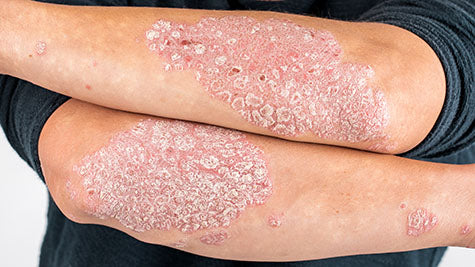
Psoriasis*
Psoriasis is a chronic autoimmune skin condition that causes rapid skin cell growth, leading to thick, scaly patches on the skin. It can affect children and adults and varies in severity. As a parent, understanding psoriasis can help you manage your child’s symptoms effectively and support them through any emotional challenges.
1. What Causes Psoriasis?
• Genetics: Psoriasis often runs in families. If a close family member has psoriasis, your child may be at a higher risk.
• Immune System Dysfunction: Psoriasis is an autoimmune disorder, meaning the immune system mistakenly attacks healthy skin cells, causing rapid skin growth.
• Environmental Triggers: Certain triggers like stress, infections, and skin injuries can activate or worsen psoriasis.
2. Symptoms to Look For
• Red, Scaly Patches: Often covered with silvery scales, these patches (or plaques) commonly appear on the elbows, knees, scalp, and lower back.
• Itching and Discomfort: While some children might not experience itching, others may feel intense itchiness or burning.
• Thickened Nails: In some cases, psoriasis can affect the nails, causing them to thicken, become pitted, or change color.
3. Types of Psoriasis in Children
• Plaque Psoriasis: The most common type, with thick red patches covered by silver scales.
• Guttate Psoriasis: Small, drop-shaped spots on the skin, often triggered by bacterial infections like strep throat.
• Inverse Psoriasis: Red, smooth lesions in skin folds, such as under the arms or around the groin.
• Pustular Psoriasis: Characterized by white pustules surrounded by red skin; rare in children but may occur.
4. Common Triggers
• Infections: Strep throat and other infections can prompt or worsen psoriasis.
• Skin Injury: Cuts, scrapes, and bug bites may lead to flare-ups, a response known as the Koebner phenomenon.
• Cold, Dry Weather: Psoriasis often worsens in colder, drier months.
• Stress: Stress can trigger or intensify psoriasis in children and adults.
• Certain Medications: Some medications, like lithium and beta-blockers, may worsen symptoms.
5. Prevention and Management Tips
• Moisturize Regularly: Keeping the skin hydrated can help reduce dryness and itching.
• Use Gentle Soaps: Opt for mild, fragrance-free soaps that won’t dry out the skin.
• Baths with Caution: Warm (not hot) baths with added colloidal oatmeal or Epsom salts can soothe the skin. Follow up with moisturizer immediately afterward.
• Sunlight in Moderation: Limited exposure to sunlight may help; however, use sunscreen as too much sun can lead to sunburn, worsening the condition.
• Avoid Scratching: Keep your child’s nails short to reduce skin damage from scratching.
6. Treatment Options
• Topical Corticosteroids: Creams or ointments prescribed by a doctor can reduce inflammation and relieve itching.
• Vitamin D Analogues: These treatments slow down skin cell growth and are often used in combination with other treatments.
• Coal Tar Products: Available in shampoos and lotions, coal tar helps reduce scaling and itching, though it has a distinct odor.
• Light Therapy: Also called phototherapy, this involves exposing the skin to controlled amounts of natural or artificial ultraviolet light under medical supervision.
• Systemic Medications: For severe cases, doctors may prescribe oral or injectable medications that address the immune system’s overactivity.
7. Emotional and Social Support
• Boost Confidence: Psoriasis can impact a child’s self-esteem, particularly if patches are visible or if they experience teasing. Encourage self-confidence and reassure them of their worth.
• Education and Advocacy: Help your child understand psoriasis and explain it to friends or classmates, if appropriate, to reduce misunderstandings.
• Join Support Groups: Connecting with other families dealing with psoriasis can provide emotional support and helpful tips.
8. When to See a Doctor
• Frequent Flare-Ups: If your child’s psoriasis is not responding to over-the-counter treatments or becomes severe, see a dermatologist.
• Joint Pain: Psoriasis can sometimes affect the joints, leading to a condition called psoriatic arthritis. If your child complains of joint pain or swelling, consult a doctor.
• Signs of Infection: Redness, warmth, or pus in psoriasis lesions may indicate infection and require medical attention.
By working closely with a dermatologist, you can find a treatment plan that manages symptoms effectively and allows your child to live comfortably and confidently with psoriasis.
Leave a comment
Comments will be approved before showing up.



